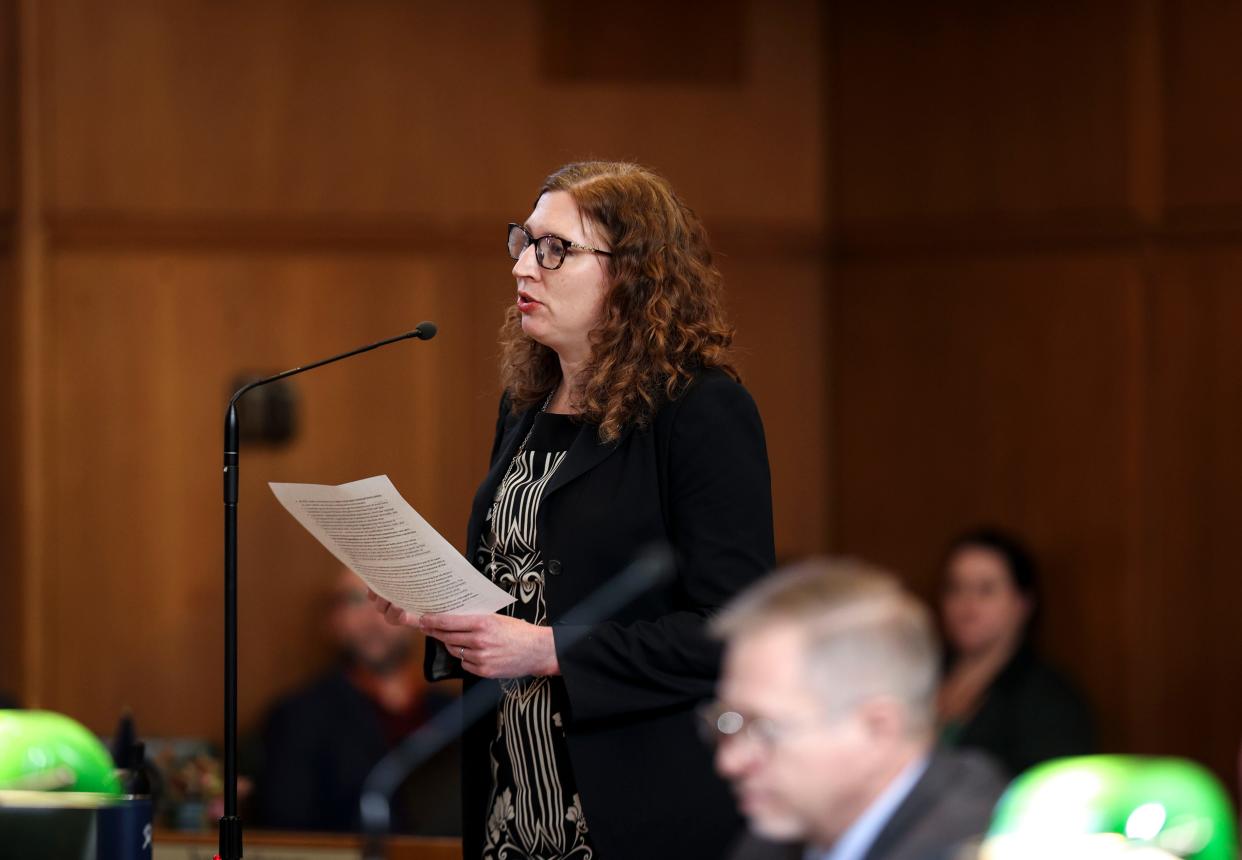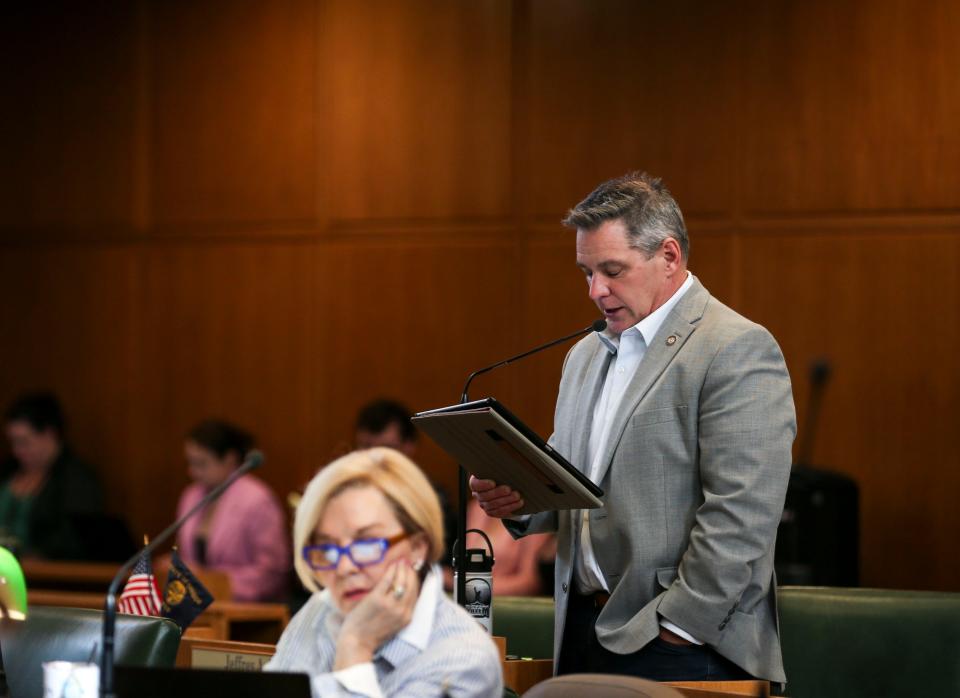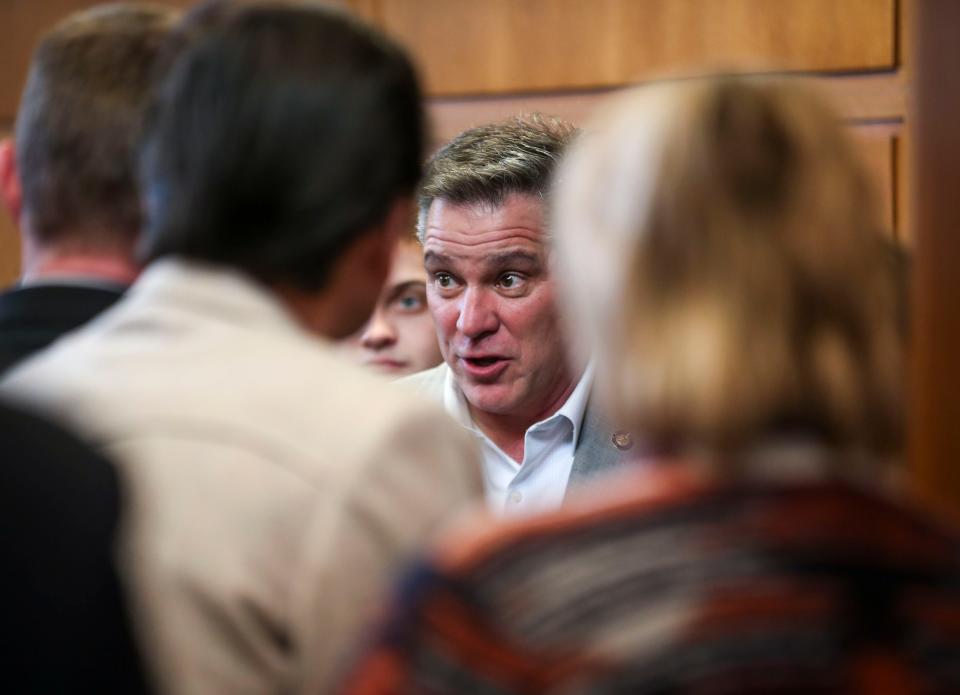Oregon Senate passes compromise campaign finance reform bill

This story was updated at 4 p.m. Thursday
Campaign finance reform is coming to Oregon in 2027, pending Gov. Tina Kotek's signature, after the Oregon Senate on Thursday passed House Bill 4024.
The proposal took shape quickly in the last week of the session and represents a compromise between labor unions, business groups, and 'good governance' groups.
The Oregon House approved the bill on Wednesday in a 52-5 vote. The Oregon Senate approved it 22-6.
Lawmakers adopted final amendments on House Bill 4024 after discussions during the session between labor unions, business groups and good-government advocates, according to House Majority Leader Rep. Julie Fahey, D-Eugene.
"We believe this bill meets Oregonians’ need for reasonable contribution limits, transparency, and accountability, without simply shifting campaign spending into ‘dark money’ activities. It also protects the ability of community organizations and nonprofits to engage in the kind of grassroots political organization that has become a hallmark of Oregon’s democracy," said House Leaders Rep. Jeff Helfrich, R-Hood River and Rep. Julie Fahey, D-Eugene in a joint statement Wednesday.
Sen. Kate Lieber, D-Portland, acknowledged the legislature's past attempts to introduce campaign finance reform.
Sen. Jeff Golden, D-Ashland, championed reform for several years but voted no Thursday. Golden said reform to build public trust required limits that "don’t let any person or organization that wants certain legislative outcomes give distractingly large donations" and a "system that's not so crammed with different contribution conduits" that it's hard to monitor contributions.
"If we don't check those two boxes, I don't see us making any progress towards building public trust in our work here," Golden said.
Sen. Elizabeth Steiner, D-Portland, also criticized the bill on the floor saying she believed Oregon's current system worked.
"I frankly resent the implication that I can be bought and paid for," Steiner said. She said she was voting in favor of the bill despite concerns because the bill was better than either of the proposals that could have been on the ballot in November.
Backers of those ballot initiative efforts said Wednesday that they would withdraw their petitions if the bill was signed into law.
Oregon is one of five states without limits on political campaign contributions and one of 11 without limits on individual candidate contributions.
Group to halt ballot initiative efforts if Oregon passes House Bill 4024
If the bill is signed into law, backers of ballot initiative efforts said they would withdraw petitions that would bring reform to November's ballot.
"This is a historic moment in the history of Oregon," said Jason Kafoury with Honest Elections Oregon during Wednesday's work session on the bill. The group had called earlier iterations of the bill "phony" and urged lawmakers to lower limits and close "huge loopholes" in the bill.
Kafoury said he was grateful an agreement had been reached to avoid an "ugly fight at the ballot." An earlier version of the bill would have sent lawmakers' version of reform to voters. The bill adopted Wednesday does not.

Dan Meek, an attorney for Honest Elections Oregon, echoed Rep. Jeff Helfrich, R-Hood River, who said pitting lawmakers' proposal and a ballot initiative from citizens against another likely one would have resulted in what legislators were attempting to reform.
"The outcome would probably be influenced by which side can afford to spend the most money and that's not going to be us," Meek said. He outlined 20 changes to the bill in a memo that Meek said the Honest Elections Oregon coalition had negotiated with lawmakers.
What does Oregon's campaign contribution limitation bill do?
The bill would limit contributions to state Representatives, state Senators, circuit court judges, or district attorneys to $3,300 per election from a person. Candidate committees would be limited to $2,000, and political party and legislative causes would be limited to contributing $15,000 per election. Small donor political committees would be limited to donating $5 per donor and could not accept more than $250 from any single donor.
In other statewide elections, contributions would be limited to $3,300 per election per person, $30,000 per election from political party and legislative caucus committees, and $10 per donor for small donor political committees.

These and other limits outlined in the bill would go into effect on January 1, 2027.
The bill also requires the Oregon Secretary of State to hire a full-time employee to provide outreach and education on the new law and to publicly release a list of the 100 largest contributors to candidates or committees 10 days before each election and other disclosure changes.
Officials comment on Oregon's campaign finance reform bill
Angela Wilhems with Oregon Business and Industry said the bill was not a perfect campaign finance system but said the organization representing over 250,000 Oregonians would support the bill.
"As I said a few weeks ago, no such system exists. You can't completely legislate money out of politics. You can't completely legislate a system that prevents really bad actors from acting badly but what you can do is create a system that allows for participation for all types of individuals and organizations," Wilhems said.
On the House floor, Helfrich said Oregonians were tired of waiting for campaign finance reform and thanked stakeholders for coming to the table.
“Let’s seize this moment, let’s get this done," Helfrich said.
Rep. Kim Wallan, R-Medford, voted yes in committee for the bill to make its way onto the House floor but explained her vote against the bill on the floor. Wallan argued the bill "doesn’t really do what it says it’s going to do" and threatened the independence of candidates.
Rep. Travis Nelson, D-Portland, voted in favor of the bill but cautioned that the Legislature needs to make sure the secretary of state had the tools necessary to implement the bill.
The bill passed with 52 votes in favor and 5 votes against.
Speaker Dan Rayfield, D-Corvallis, a longtime proponent of campaign finance reform in Oregon, said the last time the Legislature approved significant campaign finance reform was in 1975 when it repealed limits.
"49 years later, I'm proud to stand here today," Rayfield said from the dais.
The House of Representatives broke into applause after passage of the bill, which prompted a quick shake of the head from the House Clerk. Clapping technically is against decorum rules.
Dianne Lugo covers the Oregon Legislature and equity issues. Reach her at dlugo@statesmanjournal.com or on Twitter @DianneLugo
This article originally appeared on Salem Statesman Journal: Oregon campaign finance reform bill passes Senate

